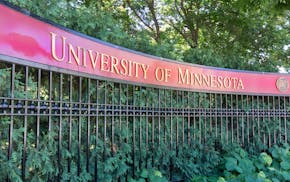Minnesota regulators have documented several incidents of sexual contact involving troubled and mentally ill children and teens at the St. Cloud Children's Home, and have cited the facility for lax supervision.
In findings issued late last month, the state Department of Human Services fined the home $5,000 and placed its license on conditional status for two years after investigating eight allegations of sexual contact that occurred between January and June 2011.
The home was blamed in six of the allegations — in some cases for poor supervision of the children and teens, and in others because the home failed to conduct required assessments of the children for their risk of committing sexual offenses.
In one incident, a 17-year-old reportedly forced a 15-year-old to perform oral sex while a staff worker was just down the hall, trying to bond with other teen residents over a game of Guitar Hero. The victim in that case had a history of being physically and sexually abused.
While the home, operated by Catholic Charities of the Diocese of St. Cloud, has made improvements, a penalty was warranted due to the breakdowns in supervision that allowed the incidents to occur, said Jerry Kerber, inspector general for the department.
"That lack of supervision, from our perspective, is what really contributed to some of the incidents, including some sexually exploitive behaviors," Kerber said on Wednesday.
No similar case like this has occurred in at least five years, he added.
Catholic Charities agreed to the fines and findings that the home was responsible for maltreatment. But it appealed the conditional license on Friday on the grounds that it has carried out many of the state's requested improvements.
Steve Bresnahan, Catholic Charities' executive director, also contested that the home failed to screen for sexual risks or develop safety plans for teens who did pose risks.
The conditional license does not change operations of the home, which shelters 62 children or teens in six "cottages," but it does require regular reporting to the state to ensure compliance with safety standards.
Some of the children and teens were placed in the home because of their lack of impulse control and sexual aggressiveness. Most suffer from some combination of anxiety, depression, hyperactivity, mood disorders or disruptive behavior disorders.
"By the time they've gotten [here], these are kids with a tremendous amount of issues," Bresnahan said. "They don't have good decisionmaking skills, so these are the kinds of things that do happen.
"I really want to be careful not to blame the kids," he added, "We should have been in the right places and doing the right things so that they didn't happen."
Bresnahan said supervision is challenging because of the multiple levels of the 90-year-old home, a former orphanage. Staffing has been increased and security cameras have been added since the incidents occurred, he said. "When any two kids are on a floor, there will always be a single staff person" on that floor, he said.
While genders weren't disclosed in the state reports, Kerber said that some of the incidents involved boys and girls and that the home is reducing the number of coed cottages as a result.
The state reports show teens going to great lengths to fool staff workers — manipulating the door alarm systems or seizing on crises when staff were distracted — to engage in sexual activity.
One of the incidents, for which the home wasn't faulted, involved a 9-year-old touching an 11-year-old's genital area in a swimming pool with staff workers 15 feet away. Another involved teens under a blanket in view of staff workers on a pontoon boat.
The home has retrained staff on supervision requirements, including the need to keep bedroom doors open and to prevent teens from sharing blankets.
Jeremy Olson • 612-673-7744
'Human error' behind Robbinsdale shelter-in-place alert that was mistakenly sent countywide

Going to Wolves or Twins tonight? How to get there (and maybe avoid traffic).
Focusing on bringing football film into frame
